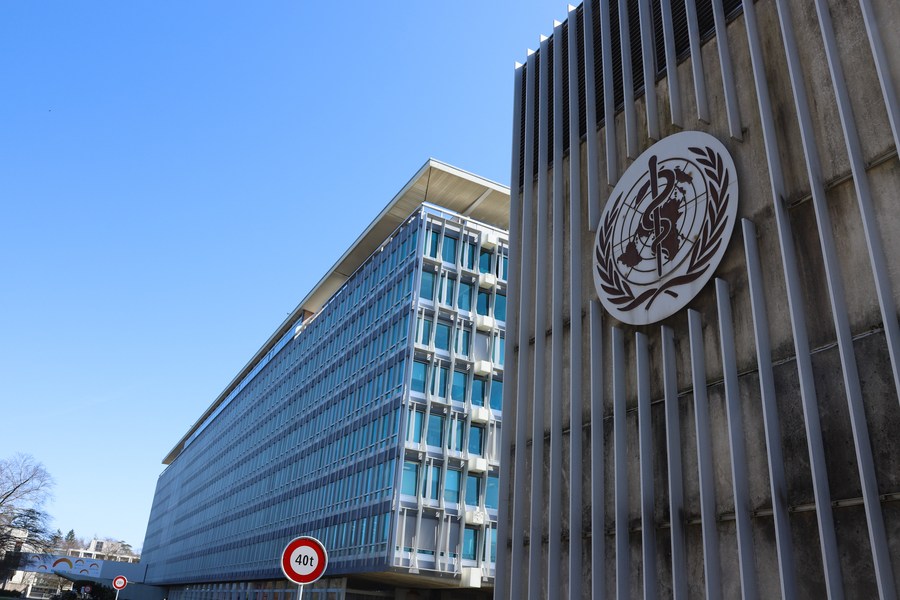Experts warn COVID-19 pandemic not over as global cases surpass 500 mln

Photo taken on March 30, 2021 shows an exterior view of the headquarters of the World Health Organization (WHO) in Geneva, Switzerland. (Xinhua/Chen Junxia)
BEIJING, April 18 (Xinhua) -- In a statement released Wednesday, the World Health Organization (WHO) announced the COVID-19 pandemic remains a "public health emergency of international concern," a day before WHO statistics showed the global caseload passed the 500-million threshold.
Under such circumstances, some nations have chosen to lift their restrictions due to gloomy economic outlooks, insufficient policy implementation and general fatigue in fighting the virus.
Experts have raised the alarm that the pandemic is far from ending, as humans have yet to completely solve the COVID-19 maze.
RISING INFECTIONS
Since last November when the Omicron strain was first found, the world's caseload almost doubled in less than six months, with more than 1 million deaths -- roughly equivalent to the population of a medium-sized city.
This partly explained why the WHO said in the statement that the COVID-19 virus "is continuing to cause high levels of morbidity and mortality, particularly among vulnerable human populations."
In the United States, about 80 million cases have been registered and the national death toll is close to one million. India and Brazil follow behind, with confirmed cases exceeding 43 million and 30 million, respectively, according to data from the WHO.
Though recent updates indicate a decreasing trend in new cases and deaths, over 7 million cases and 22,000 deaths were reported during the week of April 4-10, causing unbearable losses to numerous families.
These trends should be interpreted with caution, the WHO particularly reminded, as several countries are adjusting their testing strategies, which has resulted in lower numbers of tests performed and cases detected.
Despite a reduction in severity, the WHO pointed out, the massive increases in Omicron-infected cases have led to a large number of hospitalizations and greater pressure on healthcare systems.
In some countries, there are similar or even higher numbers of deaths when compared to previous peaks, it added.
HIGHER RISK TO PUBLIC
For countries worldwide, a shared goal is to contain the COVID-19 spread and reduce its threats to humans. But after rounds of efforts without coming by a workable solution, some have decided to drop their restrictions, including those on travel, socializing, mask-wearing, testing and vaccination. COVID-19 cases and deaths, as a result, ticked up once again.
Anthony Fauci, the top American infectious disease expert, has recently said that he expects "an uptick in cases" over the next few weeks due to the Omicron subvariant BA.2 in the United States, where states and cities have moved to lift restrictions, and that the subvariant is about 50-60 percent more transmissible than the first Omicron strain.
The United States is now averaging about 30,000 new cases, 500 deaths and 1,400 hospitalizations every day, according to the U.S. Centers for Disease Control and Prevention.
Health experts said that rolling back COVID-19 mitigation measures may have come too soon, and the continued rise in confirmed cases poses a higher risk to the public, especially children and the immunocompromised groups.
Meanwhile, the European Union (EU) is trapped in a similar plight, as multiple members have scrapped most curbs, relying on vaccination to reach "collective immunity."
"While many EU countries are lifting restrictions, we notice that the infection rates are increasing again in some member states, partly because of the circulation of Omicron BA2," Marco Cavalieri, head of the European Medicines Agency (EMA) 's strategy on biological health threats and vaccines, told reporters in March.
FAR FROM OVER
Encouragingly, vaccination rates in some parts of the world keep rising and a downward trend has been observed in new infections and deaths. However, it may not yet be time to get too optimistic.
As WHO Director General Tedros Adhanom Ghebreyesus noted in a recent speech, transmission remains very high, vaccination coverage remains very low in too many countries, and the relaxation of many public health and social measures is allowing continued transmission, with the risk of new variants emerging.
"We are pleased to see a downward trend, but the pandemic is still far from over," he stressed.
A theory has arisen that the coronavirus is evolving into a milder and less deadly virus people may coexist with. But to many medics, that sounds like taking human life as a gamble.
The British government's Scientific Advisory Group for Emergencies believed that the global pandemic is not yet over, adding that there is considerable uncertainty about the path that the pandemic will now take in Britain.
In a February teleconference, the committee predicted that new COVID-19 variants will continue to emerge. "There is no reason why future dominant variants should be similarly or less severe than Omicron," it said.
Emphasizing the need to wear masks for self-protection, Italian immunologist Antonella Viola told Corriere della Sera, the country's most read newspaper, that reinfection is another problem that can not be ignored.
"There is the possibility of reinfecting with Omicron after having contracted the Delta variant," she said. At least four in 100 people get infected with Omicron after having already contracted the Delta virus, according to the Italian National Health Institute, and the reinfection rate is growing.
For now, global scientists still have a long way to go to paint a more complete picture of the COVID-19 virus and its variants, as well as subvariants. But it is clear that the more rampant it runs, the more families will shed tears over their beloved ones.
Countries that followed the "zero-COVID" playbook have done better on every measure, from death rates to economic growth, said a report by the New Scientist magazine.
"If the target of 'zero-COVID' is now being ditched, does that mean it was a failure? A crude answer would be: only if you think saving lives and preserving economic growth constitutes a misstep," said the report.
Photos
Related Stories
- Shanghai tackles logistics bottlenecks amid virus resurgence
- Chinese mainland reports 2,723 new local COVID-19 cases
- 1,637 COVID-19 patients discharged from hospitals on Chinese mainland
- Shanghai: 2,417 local confirmed, 19,831 asymptomatic COVID-19 cases
- HKSAR gov't official urges public to take 3rd, 4th COVID-19 vaccine doses timely
Copyright © 2022 People's Daily Online. All Rights Reserved.










